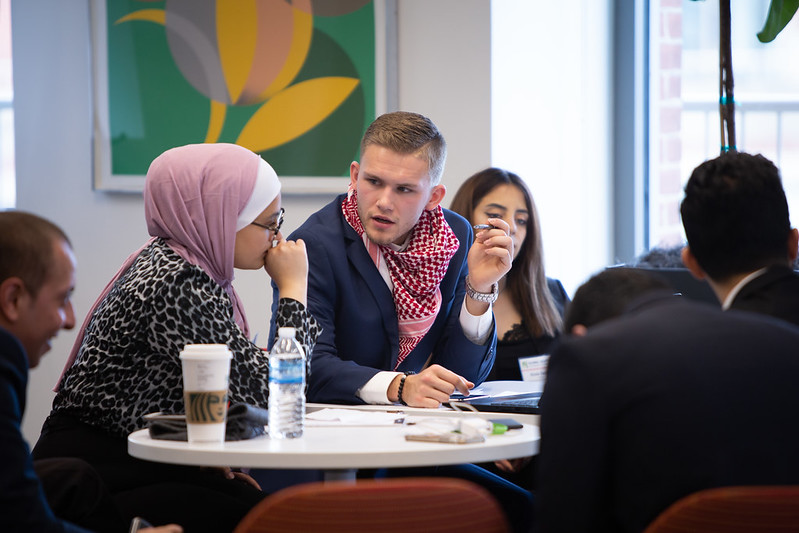Rebuilding trust through education: Four principles for practitioners

Trust in democratic institutions and civic life is eroding globally, as highlighted in Freedom House’s Freedom in the World 2024 report. This decline, driven by conflict, crises, and diminished investments in civic education, poses a significant challenge to democratic resilience. In regions like Latin America, the Middle East, and North Africa, the loss of trust is particularly acute, undermining social cohesion and democratic progress
Civic education is a critical solution to rebuild trust and strengthen democratic practices, especially in conflict-affected areas where institutions and communities face severe strain. At IREX, our work supporting civic literacy spans disciplines and programs, including initiatives focused on education for democracy, institutional strengthening, and individual empowerment. Drawing on IREX’s experience in countries such as Iraq, Ukraine, and Jordan, this article outlines four key principles for practitioners to design effective, sustainable civic education programs that foster trust and civic engagement.
Principle #1: Civic education must be locally led
Civic education programs must prioritize local leadership, ensuring that initiatives reflect and respect local voices, values, and cultural contexts. When local actors design and refine civic education programs, they remain relevant and avoid the perception of imposing external, Western ideals.
For example, the School-Based Civic Engagement for Reconciliation (SFR) Program in Iraq cultivated relationships in schools to support reconciliation and reintegration. By helping educators foster empathy, respect and dignity for all, and active citizenship, the program addressed the unique needs of Iraqi society and its complex social dynamics. SFR’s Mock Parliament activity that brings youth and their families from across regions together to discuss and debate real world issues demonstrates how community engagement around shared interests can effectively foster trust and social cohesion.
Principle #2: Real-world pedagogy over theoretical perfection
Civic education must prepare participants to navigate real-world complexities, particularly in crisis and post-conflict settings. Theoretical approaches that rely on ideal scenarios often lead to frustration when applied to imperfect systems.
Instead, curricula and instructional strategies should incorporate real-world scenarios and transparency to build resilience for navigating complex systems. Non-Western democratic innovations such as scenario-based exercises, role-playing, and debriefing sessions offer effective methods. For example, the Global Solutions Challenge uses design thinking to guide students in Iraq and Jordan through identifying and solving community-specific global issues. Students in the U.S. and Iraq have developed actionable solutions to address challenges such as frequent power outages by creating a wind turbine electricity generating kit that can be used in personal homes.
Principle #3: Thoughtfully promote respect and dignity for all
Fostering respect and dignity for all goes beyond inviting underserved communities to training spaces. It requires meaningful participation and actively fostering social trust. Our consultations with IREX civic participation experts consistently highlighted the need for participatory design to reflect communities themselves—men, women, youth, children, individuals with disabilities, and those in rural or hard-to-reach areas.
IREX’s senior technical expert Lori Mason emphasizes a “people-first” approach: “We don’t focus on dividing lines. We focus on what unites people—quality education, families, building friendships. Then, people are open to learning new content and concepts.” By centering on shared human experiences, this method builds trust and engagement among participants from varied backgrounds.
Principle #4: Experiential learning creates leaders
The most compelling civic education programs provide participants with opportunities to learn by doing. Embedding programs within local communities supports participants in building awareness, developing new skills, and adopting new behaviors. These experiential approaches lead to more sustainable and impactful outcomes.
For example, IREX’s experiential education initiatives in Iraq focus on career readiness, equipping community members with skills to address real-life challenges through innovative solutions and internships. In Ukraine, the UNITY program pairs youth civic activists with local civil servants to co-design youth programs that meet community needs. This collaboration has strengthened trust between young people and local governments while fostering leadership and civic engagement.
Let’s make civic education work
Civic education is fundamental to democratic resilience and sustainable development. At IREX, we define a civically literate person as someone equipped with the knowledge, attitudes, and behaviors necessary to fulfill the unique meaning, obligation, and virtue of citizenship in their society. This includes understanding rights and responsibilities, analyzing information critically, and engaging in civic life through voting, volunteering, and civil society activities.
Development practitioners have both the opportunity and responsibility to design initiatives that foster lasting social transformation. By centering local voices, emphasizing real-world pedagogy, embracing respect and dignity for all, and prioritizing experiential learning, we can help communities rebuild trust and reclaim civic life. These efforts are vital not only for national politics but also for the health of neighborhoods, classrooms, and communities. Together, we can cultivate the trust needed for democracy to flourish.